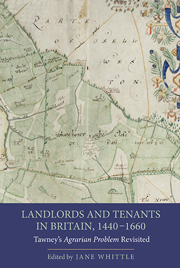Book contents
- Frontmatter
- Contents
- List of Figures
- List of Tables
- Abbreviations
- List of Contributors
- Acknowledgements
- Foreword
- Introduction: Tawney's Agrarian Problem Revisited
- 1 The Agrarian Problem, 1440–1520
- 2 Common Law and Manor Courts: Lords, Copyholders and Doing Justice in Early Tudor England
- 3 Negotiating Enclosure in Sixteenth-Century Yorkshire: The South Cave Dispute, 1530–1536
- 4 The Politics of Enclosure in Elizabethan England: Contesting ‘Neighbourship’ in Chinley (Derbyshire)
- 5 The Loss of Athelstan's Gift: The Politics of Popular Memory in Malmesbury, 1607–1633
- 6 In Search of the Scottish Agrarian Problem
- 7 The Transfer to Leasehold on Durham Cathedral Estate, 1541–1626
- 8 The Financial Rewards of Winning the Battle for Secure Customary Tenure
- 9 Risks and Rewards in Wasteland Enclosure: Lowland Lancashire c.1500–1650
- 10 Improving Landlords or Villains of the Piece? A Case Study of Early Seventeenth-Century Norfolk
- 11 The Agrarian Problem in Revolutionary England
- 12 Agrarian Capitalism and Merchant Capitalism: Tawney, Dobb, Brenner and Beyond
- Conclusions
- Select Bibliography
- Index
5 - The Loss of Athelstan's Gift: The Politics of Popular Memory in Malmesbury, 1607–1633
Published online by Cambridge University Press: 05 September 2013
- Frontmatter
- Contents
- List of Figures
- List of Tables
- Abbreviations
- List of Contributors
- Acknowledgements
- Foreword
- Introduction: Tawney's Agrarian Problem Revisited
- 1 The Agrarian Problem, 1440–1520
- 2 Common Law and Manor Courts: Lords, Copyholders and Doing Justice in Early Tudor England
- 3 Negotiating Enclosure in Sixteenth-Century Yorkshire: The South Cave Dispute, 1530–1536
- 4 The Politics of Enclosure in Elizabethan England: Contesting ‘Neighbourship’ in Chinley (Derbyshire)
- 5 The Loss of Athelstan's Gift: The Politics of Popular Memory in Malmesbury, 1607–1633
- 6 In Search of the Scottish Agrarian Problem
- 7 The Transfer to Leasehold on Durham Cathedral Estate, 1541–1626
- 8 The Financial Rewards of Winning the Battle for Secure Customary Tenure
- 9 Risks and Rewards in Wasteland Enclosure: Lowland Lancashire c.1500–1650
- 10 Improving Landlords or Villains of the Piece? A Case Study of Early Seventeenth-Century Norfolk
- 11 The Agrarian Problem in Revolutionary England
- 12 Agrarian Capitalism and Merchant Capitalism: Tawney, Dobb, Brenner and Beyond
- Conclusions
- Select Bibliography
- Index
Summary
A century after its publication, R. H. Tawney's The Agrarian Problem in the Sixteenth Century remains as imaginative, spirited and passionate as ever. For a long time, the book was neglected by early modern historians. The dismissal of The Agrarian Problem, often by those unacquainted with it, grew from Eric Kerridge's denunciation of it in 1969. Adopting a schoolmasterly tone, Kerridge chided Tawney for spending too little time in the archives (‘Time which he might have given to studying history was devoted instead to the Fabian Society and the Labour Party’) and condemned The Agrarian Problem as mere socialist propaganda. More recently, the tables have turned. The last twenty years have seen a flowering of work on customary law, much of it conducted under the influence of E. P. Thompson's 1991 book Customs in Common. This work has recaptured some of the qualities of The Agrarian Problem, most notably its recognition of the political characteristics of custom. Tawney characterised the politics of custom as follows:
The custom of the manor is a body of rules which regulates the rights and obligations of the peasants in their daily life. It is a kind of law. It is a kind of freedom. And since it is the custom [of the manor] which most concerns the mass of the peasantry, it is not the state, or the law, but the custom of the manor which forms their political environment and from which they draw their political ideas.[…]
- Type
- Chapter
- Information
- Landlords and Tenants in Britain, 1440-1660Tawney's 'Agrarian Problem' Revisited, pp. 85 - 99Publisher: Boydell & BrewerPrint publication year: 2013

